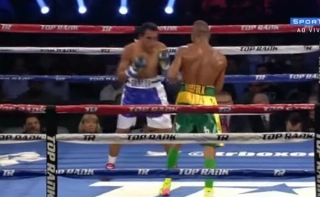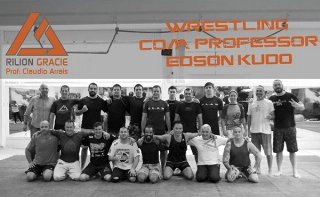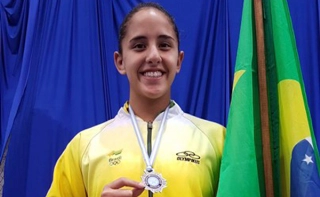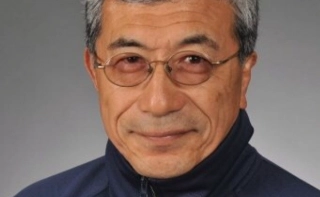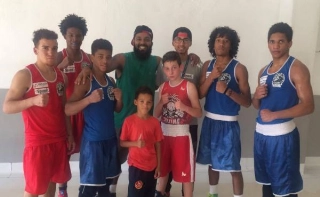Entrevista com Yuri Maier
Da humilde infância na pequena Corrientes na Argentina para o grupo de elite do wrestling mundial, Yuri Maier de 24 anos é considerado um dos maiores atletas de seu país tendo recebido o tradicional prêmio Olímpia de Ouro e é esperança de medalha em Rio 2016.
No fim de 2013 ele estreou no ranking da entidade FILA, mas este ano já não está mais, enquanto isto prepara seu retorno enquanto encoraja seus compatriotas a entrarem no tatame. Lutando com rivais da categoria dos 96 kg do estilo livre ele treina fora de seu país e assim que dominou a América do Sul.
Em entrevista ao terceiro tempo fala de seu método de trabalho, suas metas e do falecido amigo russo Besik Kudukhov, uma lenda do esporte que perdeu a vida aos 27 anos tendo alcançado o tetracampeonato mundial além de duas medalhas olímpicas.
Como e por quê você foi treinar em outros países?
Iniciei meu treinamento em outros países logo no começo de minha carreira. Wrestling não é um esporte desenvolvido na Argentina tampouco na América do Sul e como todos sabem em esporte de combates o mais importante para crescer é ter sparings de alto nível. Eu tenho de ser grato à muitos que confiaram em mim e no meu futuro no wrestling.
Do tempo em que iniciou no wrestling até agora a Argentina evoluiu em estrutura e condições para o esporte?
De certo modo creio que todos países da América do Sul evoluíram no wrestling, mas temos de trabalhar ainda mais pesado porque temos um duro inimigo... A cultura de outro tipo de esporte que domina a cabeça das crianças e as faz querer ser (Lionel) Messi e Neymar.
É o mesmo em outros países sul-americanos?
Não exatamente o mesmo. Equador, Argentina ou Paraguai não tem o mesmo orçamento que Brasil ou Venezuela no melhor momento da era (Hugo) Chávez.
Existe a possibilidade de wrestlers sul-americanos terem as mesmas condições dos países de elite?
Sim. Mas levará tempo para se desenvolver não apenas atletas, mas também técnicos, infraestrutura, juízes e criar uma tradição de wrestling em nossa sociedade.
Você está crescendo como uma liderança entre os lutadores sul-americanos ainda com pouca idade. Como lida com isto? Você lê ou mesmo gosta de política?
Eu tomo isto como uma grande responsabilidade e a mesma mentalidade que uso quando estou competindo, então faço meu melhor.
Sim, eu gosto de política porque é a ferramenta mais poderosa para trazer mudanças e ajudar meu esporte. Tenho uma grande dívida com o wrestling porque não apenas me tornei o homem que sou, mas também um exemplo aos lutadores mais jovens.
Você treinou para aquela defesa acrobática contra o russo Bekhan Goygereev ou apenas saiu naquele momento?
A verdade é que venho da ginástica olímpica, a qual pratiquei durante minha infância, e sempre tentei usar movimentos acrobáticos e a maioria apenas em treinos, mas este foi apenas minha saída para a situação.
O que sentiu ao entrar para o ranking mundial como 13º colocado? O que isto representa dentro do mundo do wrestling?
Foi um dos melhores momentos da minha carreira. Um sentimento único. É como ter um número o representando sua posição no mundo todo e significa muito além de te fazer pensar: “devo treinar mais duro para subir mais”.
O que pode dizer de sua saída do ranking?
Você sabe que nos esportes um dia se está no topo da montanha e no outro no porão. Tive má sorte no sorteio de grupos no campeonato mundial e na competição seguinte eu estava lesionado então fiquei fora de ação pelo resto do ano. 2014 será melhor!
Quem você considera seus maiores rivais?
Os mesmos países que dominam o esporte. Rússia, Azerbaijão, Irã, Cazaquistão, Ucrânia, EUA e Geórgia.
Quais sãos suas expectativas para Rio 2016? Pode conquistar uma medalha?
É meu sonho. Quando eu tinha 16 anos fiz uma tatuagem nas costas sobre Rio 2016. No início eram só os arcos olímpicos, mas agora os arcos têm a frase: “viva sua paixão” e é sobre isto que é minha vida, viver minha paixão diariamente e trabalhar por este sonho.
Como era sua relação com Besik Kudukhov?
É duro para mim falar disto. Besik foi um amigo verdadeiro que tive. Um extraordinário lutador que em sua vida pessoal ou o tinha como irmão ou apenas um desconhecido. Por conta dele todos passaram a me respeitar na Rússia e me tratar como um igual entre os parceiros de treino. Tenho boas memórias dele e é isto que mantenho em meu coração.
Interview with Yuri Maier
From a humble childhood in the small city Corrientes in Argentina to the elite squad of the wrestling world. 24 year old Yuri Maier was awarded with traditional Olimpia de Oro (Gold Olympia in free translation) and considered one of the top athletes of his country also being held as hope to bring a medal in Rio 2016.
He debuted in the FILA rankings by the end of 2013 but this year he dropped out and is planning a comeback while he encourages his compatriots to get into the mat. Fighting his rivals in the 96 kg division of freestyle he had to train outside his grounds to achieve success and dominate South-America.
In this interview he speaks about his working method, his goals and his late Russian friend Besik Kudukhov who was a four time world champion and held two Olympic medals.
How and why did you start to prepare yourself in other countries?
I have started to train in another country's very soon on my career. Wrestling is not a developed sport in Argentina and also in the South-American region and as all know in the combats sports the most important thing to grow is with a high sparring level. I have to be thankful to many people who trust on me and my future in wrestling.
From the time you started wrestling to now did Argentina evolved in structure and conditions for the sport?
In some ways I think all the countries in South America evolved in wrestling but we have to work much more harder because we have a very difficult enemy... The culture of another kind of sports who rules in the head of the children and make them dream to become (Lionel) Messi and Neymar (Argentinian and Brazilian soccer players).
Is it the same for other South-American countries?
Not exactly the same. Ecuador, Argentina or Paraguay has not the same numbers in the sports budget like Brasil or Venezuela - in the best (Hugo) Chavez time -.
Is there a possibility for South-American wrestlers to have the same conditions of the elite countries of this sport?
Yes. But it will take time to evolve not only athletes but also coaches, the infrastructure, jury and create a tradition of wrestling in the society.
You’re becoming a voice among South-American wrestlers at such a young age. How you deal with that? Do you read about or like Politics?
I take that with a high responsibility and the same mentality then I use to compete so I do my best.
Yes I like politics because for me is the most powerful tool to make a change and help my sport. I feel a great debt towards wrestling and not only I became the man who I am now but also it put me as role model to the younger wrestlers.
Did you train to apply that acrobatic move against the Russian Bekhan Goygereev or it just came in the moment?
The truth is that I come from gymnastics as I did it in my younger years and I always try to do acrobatic moves most of it only in training but this one was just my way to react in that situation.
What did you feel when you reached the world ranking as number 13? What this represents to the wrestling world?
Was one of the best moments of my career. A rare feeling. It is like having a number who represents where you are in the whole planet and it means a lot and make you think: "I have to train harder and claim to a better place".
What can you say about not being in the ranking anymore?
You know sports are like this one day you can be in the top of the hill and in the next day in the basement. I had a bad luck in the groups of the world Championship and the competition after I was injured and forced to be out of season for the rest of the year. 2014 will be better!
Who do you consider the top rivals?
The same country who rules my sport. Russia, Azerbaijan, Iran, Kazakhstan, Ukraine, USA and Georgia.
What are your expectations for Rio 2016? Can you get a medal?
It is my dream. When I was 16 years I made a tattoo on my back about Rio 2016. In the beginning was just the Olympics rings but now the rings have the slogan "Live your passion" and that's is my life about living my passion day by day working just for one dream.
How was your relationship with Besik Kudukhov?
It is hard for me to talk about this. Besik was a real good friend of mine. He was an amazing wrestler that in his personal life you only can be his brother or just unknown guy for him. Because of him everybody started to respect me in Russia and treat me as an equal training partner. I have many good memories with him and that's all what I'm going keep in my heart.


Fotos: Yuri Maier / Yilmar e Yuri Maier / Divulgação
Medalhista de ouro olímpico continua invicto no boxe profissional
14/05/2018Técnico Edson Kudo ensina fundamentos do wrestling para alunos da Rilion Gracie
13/10/2017Brasileira é vice-campeã de sul-americano cadete de wrestling
21/08/2017Entrevista com Tadaaki Hatta, mestre de campeões olímpicos do wrestling
17/08/2017Garimpando Ouro Olímpico: Projeto busca apoio para mostrar novos talentos do boxe brasileiro
26/06/2017





